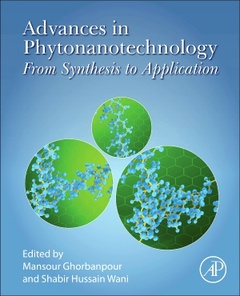Advances in Phytonanotechnology From Synthesis to Application
Coordonnateurs : Ghorbanpour Mansour, Wani Shabir Hussain

Advances in Phytonanotechnology: From Synthesis to Application guides readers through various applications of nanomaterials on plants by presenting the latest research related to nanotechnology and nanomaterials on plant systems. The book focuses on the effects of these applications on plant morphology, physiology, biochemistry, ecology and genetics. Sections cover the impact on plant yield, techniques, a review of positive and negative impacts, and an overview of current policies regarding the use of nanotechnology on plants. Additionally, the book offers insights into the appropriate application of nanoscience to plants and crops for improved outcome and an exploration of their bioavailability and toxicity in the environment.
2. Engineered nanomaterials: classification and strategies for physico-chemical characterization
3. Phytosynthesis of nano-scale materials
4. Nanomaterials delivery to plants (mode of entry, uptake, translocation, accumulation, biotransformation and barriers)
5. Advanced analytical techniques for the measurement of nanomaterials in plant samples
6. Germination and early growth responses of higher vascular plants to different types of nanomaterials
7. Nanotoxicity based studies (phytotoxicity, cytotoxicity, genotoxicity and ecotoxicity) in plant sciences
8. Nanotechnology for phytoremediation of heavy metals (mechanisms of nanomaterial-mediated alleviation of toxic metals)
9. Plant nanobionics, and role of nanomaterials on elicitation of plant primary and secondary metabolites
10. Morphological, physiological and biochemical responses of plants to nanoparticulate exposure under different environmental perturbations
11. Plant DNA extraction and purification using nanocomposites
12. Induction of plant defense machinery against nanomaterials
13.Application of nanoagrochemicals in plant production sector
14. Nanocarrier based antimicrobial phytochemicals
15. Development and commercialization of sensor nanotechnologies in plant science
16. Effect of nanoparticles on phytopathogens
17. Biotechnology and nanotechnology: Natural allies for brave new horizons
Dr. Ghorbanpour obtained his MSc. and Ph.D degrees in Crop Ecology from Tehran university (Karaj, Iran), and has been a visiting scholar in the Nutrient Uptake and Toxicity Stress (NUTS) group at the University of Western Australia, Perth, Australia. He specializes in medicinal and aromatic plants production and domestication. His research interests include medicinal plants and their bioactive Ingredients under stressful environments, discovery or development of new therapeutic plants/and products, phytonanotechnology, bioavailability of emerging contaminants in plant-soil systems, agricultural practices/techniques for increasing plant primary and secondary metabolites, Diversity of natural products and bioactive compounds of aromatic medicinal plants, etc.
Dr. Ghorbanpour has published over 160 journal articles, 55 book chapters and 12 book volumes. He was listed as “Top 2% scientists of the world in 3 consecutive years(2019-2021) by Stanford University USA
Shabir Hussain Wani is Scientist cum Assistant Professor at Shere-e- Kashmir University of Agricultural Sciences and Technology of Kashmir where his research focuses on plant breeding and genetics/plant biotechnology.
Included among his awards are:
Fellow of the Linnean Society of London-2017
YOUNG SCIENTIST Award (2017), Indian Ecological Society Punjab Agricultural University Ludhiana.
Young Scientist of the Year 2016, International foundation for Environment and Ecology Kolkata India.
YOUNG ACHIEVER AWARD – 2016, Society for Advancement of Human and Nature (SADHNA) YS Parmar University of Horticulture and Forestry
YOUNG SCIENTIST Award (2015), Society for Plant Research, Meerut, India
YOUNG SCIENTIST Award (2009), Society for Promotion of Plant Science Research. Jaipur National University, Jaipur.
FELLOW OF SOCIETY FOR PLANT RESEARCH AWARD – 2011-12
- Discusses the morphological, physiological and biochemical responses of plants to nanomaterials and the ability of the nanomaterials in modifying the genetic constitution of plants
- Emphasizes new applications of nanomaterials, including nanosensors technology and nanomaterials as nanocarriers based antimicrobial phytochemicals
- Presents the role of nanotechnology as a novel technique for the remediation of heavy metals by plants
Date de parution : 05-2019
Ouvrage de 471 p.
19x23.3 cm
Thèmes d’Advances in Phytonanotechnology :
Mots-clés :
Agriculture; Anticancer; Antidiabetic; Antimicrobial activity; Antioxidative system; Apoplast; Application; Au nanocomposite; Bioavailability; Biosynthesis; Carrots; Characterization; Chitosan; Computer simulation; Copper nanoparticles; Crop productivity; Crop yield; Cyanide; Defense mechanisms; Disease management; DNA extraction; Egalitarians; Electrotechnology; Engineered nanomaterials; Enzymatic and nonenzymatic; Experimental methods and techniques; Food chain; Fragmentation; Genetic material; Green synthesis; Growth responses; Heavy metals; Hysteresis; Lateral flow immune analysis; Liposomes; Loopholes; Metabolites; Metal nanoparticles; Metallic nanoparticles; Micelles; Multi-walled carbon nanotube; Nano systems; Nanoagrochemicals; Nanocapsules; Nanocarriers; Nanocatalysts; Nanoemulsions; Nanoencapsulation; Nanofertilizer; Nano-fertilizer; Nanofertilizers; Nanofilters; Nanoforms; Nanomaterial; Nanomaterial characterization; Nanomaterials; Nanoparticles; Nanopesticide; Nano-pesticide; Nanopesticides; Nanoscience; Nanostructured lipid carriers; Nanotechnology; Nano-thermodynamics; Optical nanosensor; Optimization; Phase transition; Phenol nanoparticles; Physical and chemical properties; Phytochemicals; Phytonanotechnology; Phytoremediation; Phytosynthesis; Plant extract; Plant interactions; Plant-mediated synthesis; Poly (lactide-co-glycolide) nanoparticles; Reactive oxygen species; Sermon; Small systems; Solid lipid nanoparticles; Statistical mechanical; Sticks; Synthesis techniques; Thermodynamics; Thiourea; Tobacco mosaic virus; Toxicity; Translocation; Triacetylcellulose; Uptake; van der Waals equation of state; Virus detection; Wound healing potential; Zinc nanoparticles



